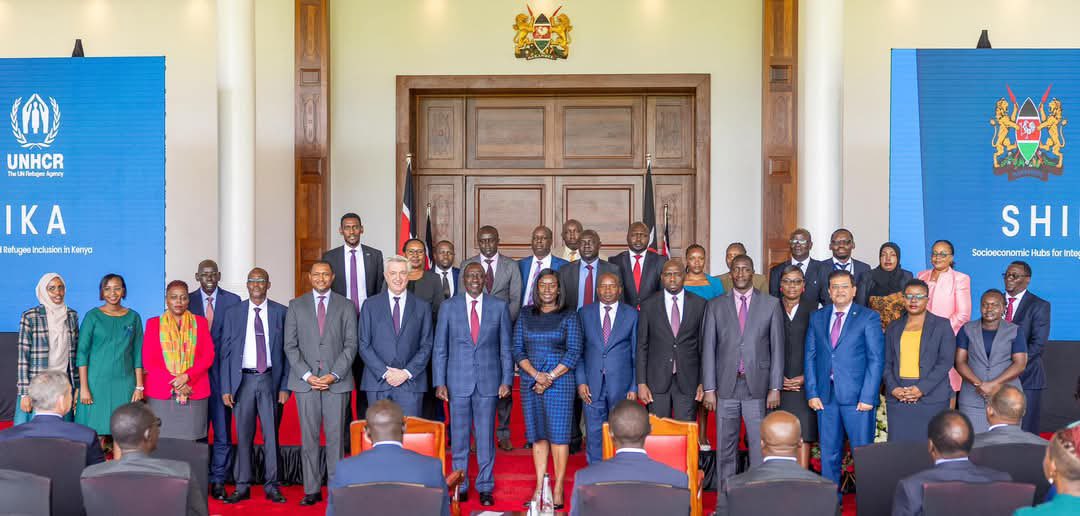Kenya Unveils Shirika Plan to Transform Refugee Camps into Thriving Municipalities
The plan seeks to integrate these communities into the broader Kenyan society by establishing self-sufficient municipalities where both refugees and host communities can thrive together.

The Government of Kenya has launched a groundbreaking initiative aimed at transforming the lives of more than 830,000 refugees and asylum-seekers along with their host communities. The Shirika Plan, named after the Swahili word for "cooperation," is an ambitious strategy designed to transition refugee camps into integrated municipalities, providing improved economic opportunities, healthcare, education, and essential services for both refugees and local residents.
A Historic Shift Towards Inclusion
For more than three decades, Kenya has played host to a large refugee population, predominantly from neighboring countries such as Somalia, South Sudan, Burundi, and the Democratic Republic of the Congo. The country currently houses two of the world’s largest refugee camps: Dadaab in Garissa County, home to over 420,000 people, and Kakuma in Turkana County, which shelters more than 300,000 individuals.
With the launch of the Shirika Plan, the Kenyan government, in partnership with UNHCR, other UN agencies, international donors, humanitarian organizations, development partners, and the private sector, is taking a bold step towards ensuring greater refugee inclusion. The plan seeks to integrate these communities into the broader Kenyan society by establishing self-sufficient municipalities where both refugees and host communities can thrive together.
Aligning with Kenya’s Policy Reforms
The Shirika Plan builds on Kenya’s commitment to the Global Compact on Refugees and reinforces the country’s progressive stance on refugee management. It follows legislative milestones such as the Refugees Act of 2021, which recognized the need for a shift from refugee dependency on humanitarian aid towards self-reliance and integration into the national economy.
Kenya’s President, H.E. Dr. William Samoei Ruto, officially launched the plan at a high-profile event in Nairobi, where he reaffirmed the government’s dedication to long-term solutions for refugees.
“The Shirika Plan now gives us a framework to collaborate more ambitiously and pursue historic achievements that will guarantee hope and dignity for refugees while giving host communities due recognition,” President Ruto stated. “This is our bold, homegrown solution, which amplifies the African Union’s call for African solutions to not only Africa’s problems but also global challenges.”
Economic and Social Impact
The transformation of refugee camps into municipalities is expected to bring significant economic and social benefits. The initiative will facilitate employment opportunities, vocational training, and business development for both refugees and Kenyan citizens. It also aims to attract private sector investment and financial support from international donors to create sustainable infrastructure and services.
Under the Shirika Plan, local and refugee populations will have equal access to healthcare, education, and public utilities, ensuring a cohesive and inclusive society. The development of these municipalities is expected to reduce the dependency on humanitarian aid, promote self-sufficiency, and foster social cohesion between refugees and their hosts.
Global Support and Call for Funding
The initiative has garnered strong support from the UN High Commissioner for Refugees, Filippo Grandi, who lauded Kenya’s leadership in refugee management.
“Kenya is showing the world that a story of cooperation, inclusion, and hope is not only possible but also necessary and beneficial to all,” Grandi said. “Shirika recognizes that solutions which shift away from refugee dependency on humanitarian aid towards greater self-reliance are achievable. UNHCR is committed to supporting the government of Kenya to turn this innovative plan into a reality.”
To fully implement the Shirika Plan, Kenya and UNHCR have called on international donors, financial institutions, and private organizations to provide the necessary funding and support. The success of this initiative will depend on sustained investments and partnerships that ensure its long-term viability.
A Model for Other Nations
Kenya’s Shirika Plan is expected to serve as a model for other countries dealing with protracted refugee situations. By embracing a cooperative and inclusive approach, the initiative presents a replicable blueprint for transforming refugee-hosting regions into thriving, self-sufficient communities.
As the plan moves forward, Kenya remains committed to ensuring that refugees and their hosts share in the benefits of economic growth and social development. If fully realized, the Shirika Plan has the potential to redefine refugee management and set a global precedent for long-term, sustainable solutions to displacement challenges.
- READ MORE ON:
- Shirika Plan
- Kenya










